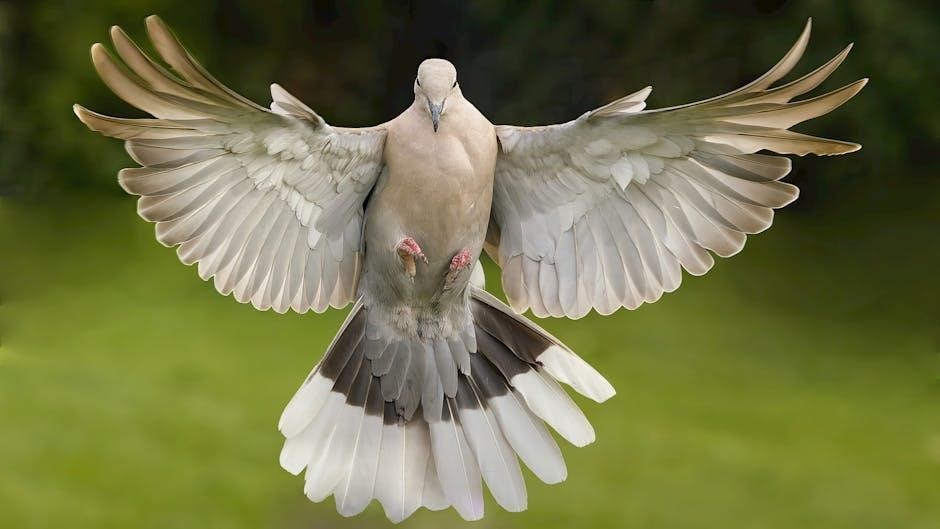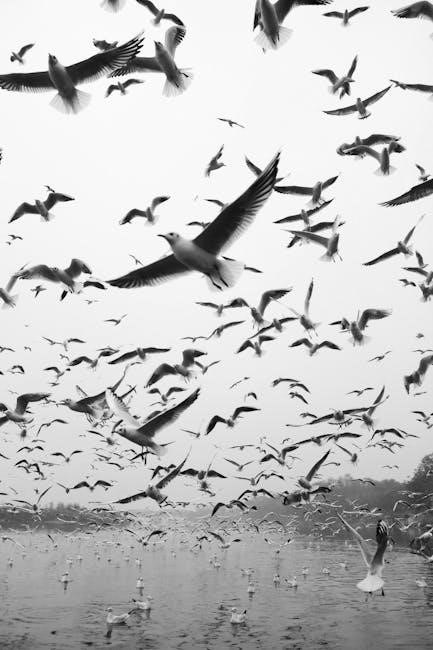
William Golding’s Lord of the Flies, a Nobel Prize-winning novel, explores themes of human nature, society, and survival. Its enduring relevance sparks interest, leading many to seek free PDF versions online. This guide provides insights into accessing and understanding the book effectively.

Section 1: Understanding “Lord of the Flies”

Lord of the Flies, written by Nobel Prize-winning author William Golding, is a timeless novel exploring human nature, morality, and societal structures. The book follows a group of boys stranded on an island, revealing their descent into chaos and savagery, mirroring real-world conflicts and human instincts.
1.1 Brief Overview of the Novel
Lord of the Flies, written by William Golding and published in 1954, is a gripping tale of survival, morality, and human nature. The story follows a group of British schoolboys stranded on a remote island after a plane crash, with no adult supervision. Initially, the boys attempt to create a utopian society, electing leaders and establishing rules. However, as time passes and fears intensify, their civilization crumbles, revealing their primal instincts and descent into savagery.

The novel explores themes of power, fear, and the inherent darkness within humanity. Through the characters of Ralph, Jack, Piggy, and others, Golding illustrates how quickly societal norms can disintegrate when individuals are isolated and faced with survival challenges. The boys’ obsession with hunting and their fear of a mythical “beast” symbolize the deeper fears and conflicts present in human society.
The novel’s title, Lord of the Flies, refers to the pig’s head impaled on a stake, a symbol of the boys’ sacrifice to the “beast” and their eventual surrender to chaos. The book’s stark and haunting conclusion underscores the fragility of human morality and the ease with which order can collapse.
With over 20 million copies sold, Lord of the Flies remains a timeless classic in world literature, sparking reflection on the nature of humanity and society. Its universal themes continue to resonate with readers, making it a must-read for anyone exploring the depths of human behavior.
1.2 Author Background: William Golding
William Golding, a renowned British novelist, was born on September 19, 1911, in St. Columb Minor, Cornwall, and passed away on June 19, 1993. He is best known for his thought-provoking works that delve into the complexities of human nature. Golding studied natural sciences at Oxford University but later shifted to English literature, reflecting his deep passion for writing. Before gaining fame as a novelist, he worked as a schoolteacher, a experience that likely influenced his insights into youthful behavior and societal dynamics.
Golding’s writing career took off after World War II, during which he served in the Royal Navy. His wartime experiences profoundly shaped his worldview and provided fodder for his exploration of humanity’s darker aspects. Lord of the Flies, his debut novel, became an instant success and cemented his reputation as a literary giant. Over his career, he authored numerous novels, including The Inheritors, Pincher Martin, and Free Fall, each exploring themes of morality, survival, and the human condition.
Golding’s work earned him the Nobel Prize in Literature in 1983, solidifying his legacy as one of the most influential writers of the 20th century. His ability to weave compelling narratives around profound philosophical questions continues to captivate readers and inspire new adaptations in film, television, and theater. His writing remains a testament to his boundless curiosity about the complexities of human behavior.
1.3 Main Themes and Symbolism
Lord of the Flies by William Golding is a rich tapestry of themes and symbolism, exploring the inherent nature of humanity. Central to the novel is the conflict between civilization and savagery, as embodied by the boys’ descent into chaos on the island. The conch shell symbolizes order and democracy, while the “beast” represents the primal fears that drive human behavior. The island itself serves as a microcosm of society, where power struggles and moral decay unfold.
The novel delves into themes of power dynamics, as characters like Jack and Ralph embody contrasting leadership styles—Ralph representing reason and order, and Jack symbolizing desire for control and dominance. Fear, both of the unknown and of each other, is a pervasive theme, driving the boys’ actions and decisions. The pig’s head, or “Lord of the Flies,” is a potent symbol of evil and the corruption of innocence.

Golding’s use of symbolism extends to the boys’ progression from innocence to savagery, reflecting the loss of moral constraints when societal structures are removed. The novel ultimately presents a bleak view of human nature, suggesting that civilization is merely a thin veneer over inherent barbarism. These themes and symbols make Lord of the Flies a timeless exploration of humanity’s darker aspects.
1.4 Historical Context and Relevance
Lord of the Flies, written by William Golding in 1954, is deeply rooted in the historical context of its time. Golding, a British author and former schoolteacher, drew inspiration from his experiences in World War II, which profoundly shaped his views on human nature. The novel reflects the post-war era’s questioning of humanity’s inherent goodness and the rise of existentialist thought.
The story of boys stranded on an island, descending into chaos, resonated with the Cold War anxieties of the 1950s. It mirrored fears of societal collapse and the dangers of unchecked power. Golding’s exploration of primal instincts and the erosion of civilization tapped into the era’s concerns about human morality and the fragility of social structures.
Despite being written over six decades ago, the novel remains relevant today. Its themes of groupthink, fear, and the struggle for power align with contemporary discussions on social media, politics, and human behavior. The book’s universal themes continue to provoke reflection on humanity’s capacity for both good and evil, ensuring its enduring legacy in literature and education.
Golding’s work not only critiques societal norms but also challenges readers to confront uncomfortable truths about human nature. This timeless relevance explains why Lord of the Flies remains a cornerstone of literary study and why readers continue to seek accessible formats, such as free PDFs, to engage with its profound insights.

Section 2: Accessing “Lord of the Flies” in PDF Format
William Golding’s Lord of the Flies remains a widely sought-after novel, with over 20 million copies sold. Readers often seek free PDF versions for convenience and cost-effectiveness. Online platforms offer easy access to downloadable formats, making the book accessible worldwide. Additionally, study guides and adaptations further enhance its educational and cultural value.
2.1 Why Readers Seek a Free PDF

Readers seek free PDF versions of Lord of the Flies for several reasons. Cost is a significant factor, as purchasing books can be expensive, especially for students or casual readers. Additionally, the convenience of digital formats allows for easy access across devices, making it ideal for on-the-go reading. Some may also prefer PDFs for their ability to be shared or stored efficiently. Furthermore, the rise of online learning and digital education has increased demand for accessible, downloadable materials. For many, finding a free PDF is a practical solution to explore this classic novel without financial or logistical barriers. This demand highlights the enduring popularity of Golding’s work and its relevance in modern education and literature.
2.2 Legal and Ethical Considerations
Downloading a free PDF of Lord of the Flies raises important legal and ethical issues. The novel, written by William Golding, is protected by copyright laws, and distributing or downloading pirated copies without permission is illegal. Copyright infringement can result in legal consequences, including fines and penalties. Ethically, it is important to respect the intellectual property rights of authors and publishers, who invest significant time and resources into creating and distributing literary works. While the desire for free access to educational materials is understandable, it is essential to consider the impact on the publishing industry and the livelihoods of authors. Many online platforms that offer free PDFs of copyrighted books operate illegally, putting users at risk of downloading malicious files or violating copyright laws. To avoid these issues, readers are encouraged to explore legitimate options, such as purchasing the book, borrowing it from a library, or accessing it through authorized digital platforms. Supporting authors and publishers ensures that high-quality literary works remain available for future generations.
2.3 Popular Sources for Downloading the PDF
Several online platforms offer free PDF downloads of Lord of the Flies, though users must exercise caution to ensure they are accessing the file legally and safely. Popular sources include:
- Google Drive and Dropbox: Many users share PDFs via cloud storage services, making them easily accessible with a direct link.
- Scribd and PDF Drive: These platforms host a wide range of eBooks and documents, including classic literature.
- Project Gutenberg and ManyBooks: While primarily for public domain works, some users upload modern titles like Lord of the Flies to these sites.
- Academia.edu and ResearchGate: These academic platforms occasionally feature user-shared PDFs of the novel.
- Archive.org: This digital library sometimes hosts versions of the book, though availability may vary.

Before downloading, verify the credibility of the source to avoid malicious files. Additionally, some platforms may require free registration or offer the PDF as part of a study guide or educational resource. Always prioritize legal and ethical downloading practices to support authors and publishers.
2.4 Tips for Reading the PDF Effectively
Reading Lord of the Flies in PDF format offers convenience, but maximizing your reading experience requires some strategy. First, ensure your device has a reliable PDF reader with features like zoom, bookmarks, and night mode for comfort. Adjust the font size and brightness to reduce eye strain, especially during extended reading sessions.
- Navigation: Use the table of contents or bookmarks to quickly jump between chapters, helping you track the narrative flow and revisit key scenes.
- Note-Taking: Utilize annotation tools to highlight important passages, note themes, and record questions or insights. This enhances comprehension and facilitates deeper analysis.
- Study Guides: Many PDF versions include study guides or discussion questions. Use these to explore themes like human nature, societal structure, and morality.
- Reading Environment: Create a distraction-free space for immersive reading. Consider using blue light filtering glasses or apps to reduce screen-related fatigue.
- Regular Breaks: Take short breaks to process complex ideas. Reflecting on the material periodically can improve retention and understanding.

By employing these strategies, you can engage more deeply with Golding’s profound exploration of human behavior and societal dynamics, making your reading experience both enjoyable and enriching.
William Golding’s Lord of the Flies remains a timeless exploration of human nature, society, and survival, resonating with readers worldwide. The availability of free PDF versions has made the novel more accessible, allowing audiences to engage with its profound themes and complex characters. While seeking a free PDF can be convenient, it’s important to consider legal and ethical implications, ensuring that access respects the rights of authors and publishers.
The internet provides numerous platforms for downloading Lord of the Flies in PDF format, catering to diverse reading preferences. Whether for educational purposes, personal enjoyment, or critical analysis, the digital version offers flexibility and ease of use. However, readers should prioritize quality and accuracy when selecting a source to ensure an uninterrupted and authentic reading experience.
 what stock trade in conjunction with qqq options pdf
what stock trade in conjunction with qqq options pdf  the very hungry caterpillar printables pdf free
the very hungry caterpillar printables pdf free  ged social studies practice test pdf
ged social studies practice test pdf  i modi the sixteen pleasures pdf
i modi the sixteen pleasures pdf  elliott wave theory pdf
elliott wave theory pdf  medium sudoku printable pdf
medium sudoku printable pdf  lifebreath digital wall control manual
lifebreath digital wall control manual